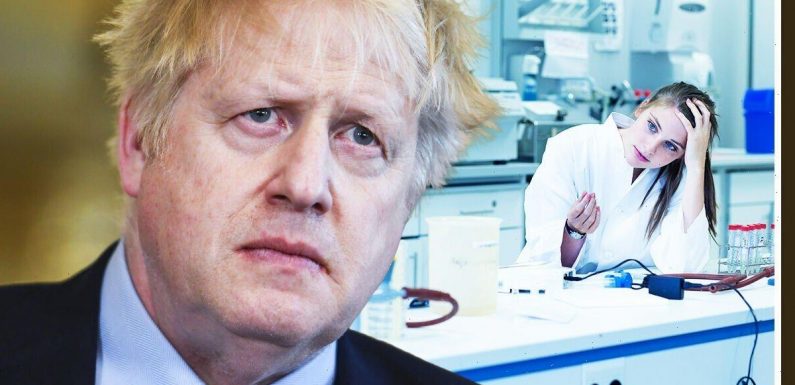
Frost admits Britain needs 'benefits of Brexit to start paying off’
We use your sign-up to provide content in ways you’ve consented to and to improve our understanding of you. This may include adverts from us and 3rd parties based on our understanding. You can unsubscribe at any time. More info
Britain was supposed to contribute £15billion towards Horizon Europe, the bloc’s £80billion flagship research programme, so its researchers could access the EU’s huge pool of funding and collaborate with European partners. But EU Commissioner Mariya Gabriel told the UK it cannot gain associated-member status until the Northern Ireland protocol row is resolved. This is despite participation being a feature of the Trade and Cooperation (TCA) Brexit agreement.
Now, scientists who had been promised grants by the European Research Council (ERC) have been told that they might not receive the money if a deal is not stuck soon.
Professor Thiemo Fetzer from Warwick University was thrilled to get promised €1.5million (£1.3million) of funding from the ERC for his project, which he hailed as one of the most “prestigious” grants in the science world.
But he told Express.co.uk that the Brexit “brain drain” has sparked a high degree of “anxiety” and “uncertainty” around the future of his project.
He explained: “There is this whole prospect of uncertainty which was not expected.
“There was clear guidance that UK association was underway, it was just a matter of time.


“But then because of the political process, this has been disrupted.
“All this creates anxiety, uncertainty, hold up issues with the partners involves, and it just raises again lots and lots of questions.”
But Prof Fetzer does not believe that the EU is entirely to blame for these issues.
He added: “I have a hard time portraying the EU as being the bad actor in this setting because it is just a natural consequence of the UK trying to cherry-pick its way through the EU.
“Horizon Europe association was part of the bundle agreed as part of the FTA.

“But then the UK has decided unilaterally not to implement certain aspects of the FTA, so it makes sense that the EU is saying that Britain is trying to cherry pick, which is a systemic risk to the legal architecture that the EU poses.”
He went on: “The UK does not have a particularly strong track record of delivering on promises that it makes.
“This then raises further questions that many of the scientific community had in this country in the wake of Brexit. Can we still trust in the underlying institutions?
“It raises the awareness of the vulnerability that people face because just with the stroke of a pen or at a whim’s notice or will by some individuals, some life plans can be thrown in the air.
“This is why the brain drain that Brexit will induce is not going to be an avalanche but a slow trickle because these things just keep happening, keep repeating and people will be re-evaluating their positions.”
DON’T MISS
Russia’s ‘only oil pipeline to EU’ in flames – 3 countries face crisis [INSIGHT]
Forget Satan 2! US £157bn project can wipe out Putin’s missile [REPORT]
Bulgaria and Greece break EU ranks with new nuclear plan [REVEAL]

But Prof Fetzer did say that both sides could have offered up more help to scientists who have been left in the dark.
He added: “The ERC could be doing a much better job at providing guidance, providing communication. I have been waiting for two weeks to hear from them about a Q&A about what to expect.”
The ERC wrote letters to 98 experts who were promised that they would receive £145million in grants that they would not receive funding if Brexit negotiations are not smoothed over.
But the Government was prepared for this, setting up a backup funding instrument via the financial guarantee scheme to be administered by UK Research and Innovation

Science Minister George Freeman has promised that he will let guaranteed replacement funding run until December 2022.
But Prof Fetzer was not convinced by this option.
He told Express.co.uk: “The vast majority of them (researchers) would go with default around the UKRI guarantee, but many of them are deeply concerned about the process.
“There are questions you have to say no to the ERC to get the UKRI guarantee so you have to say no to one thing and there is uncertainty as to whether you will get the other thing.”
Source: Read Full Article